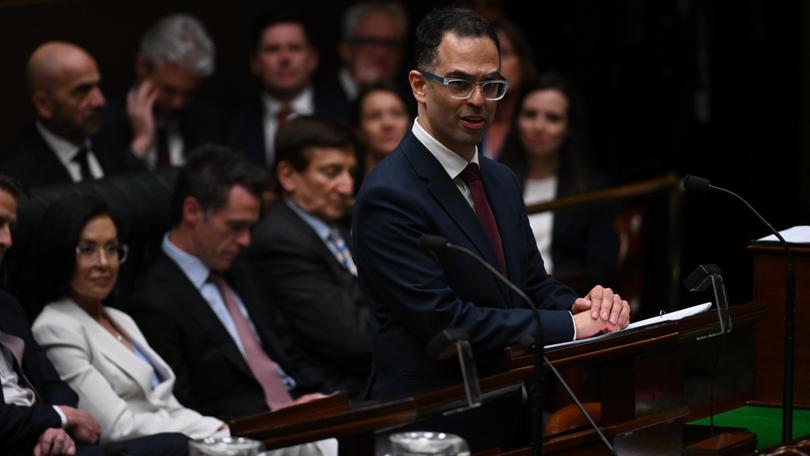Record housing spend, Medicare boost and toll relief in NSW Treasurer Daniel Mookhey’s budget of ‘must haves’
NSW Treasurer Daniel Mookhey unveiled a budget of ‘must haves’ with the state’s biggest ever public housing investment and a first-time Medicare intervention.

The biggest public housing investment in history, a first of its kind spend on Medicare, $500m in toll relief and new roads for western Sydney formed the backbone of NSW Treasurer Daniel Mookhey sparse second budget, one of “must haves, not nice to haves”.
There will be more than 8,400 new social housing dwellings in a record $5.1b spend to counter the housing crisis, with at least half to be provided to victims of domestic violence.
Up to 30,000 new homes will be created in a partnership between Homes NSW, Landcom and the private sector, partially using vacant government land identified in an ongoing audit.
Sign up to The Nightly's newsletters.
Get the first look at the digital newspaper, curated daily stories and breaking headlines delivered to your inbox.
By continuing you agree to our Terms and Privacy Policy.NSW has also made its first-ever policy intervention into Medicare with a $188.8m bulk billing support scheme that offers payroll tax rebates to GPs who bulk bill 80 per cent of their patients.
But along with $5.2b to roads including infrastructure around Sydney’s new airport, there were few other big offerings in a budget which Mr Mookhey says is contending with an $11.9b hit over the next four years following the Commonwealth Grants Commission’s contentious new GST carve up.
Delivering his second budget in nine months, the State’s 67th treasurer sounded a cautiously optimistic tone about the NSW economy and said the Government’s main priority was families.
“It is a careful budget in difficult economic times,” Mr Mookhey said.
“What this budget delivers for families is more help with the cost of living, better schools in the neighbourhoods, hospitals that they can rely on and a roof over their head.
“We’ve been very, very careful about every single dollar we have been spending.”
He said the NSW deficit would fall from $9.7b this financial year to $3.6b in 2024-25 and down to $1.5b in 2027-28. Gross debt was also set to be $9.3b lower than predicted by the previous coalition government.
“NSW will stop borrowing money to pay our day-to-day bills,” Mr Mookhey said in his budget speech.
“The state is on track for a $4.9b cash-operating surplus in the coming financial year.”
These savings were partly driven by a two-year senior public sector pay freeze which had helped bring employee expense growth down to 3.2 per cent compared to 4.7 per cent under the previous government.
Revenue was also revised up by $10.7b over four years since the past half-year review, partially on the back of land tax and stamp duty from the State’s buoyant property market.
Mr Mookhey said the record $5.1b housing spend would create 30,000 homes, partly on newly released government land identified in an ongoing audit of unused State-owned properties and landholdings.
There would be 8,400 social homes, including 6,200 new builds, as well as $1b towards a “maintenance blitz” of 33,500 existing homes.
Affordable housing for key workers including police, teachers, nurses and paramedics was boosted by $655.1m including $450m in “build to rent” properties in cities across the State.
“Why would we risk a future that bars our children from ever owning a home when home ownership has been the birthright of every other generation of Australians,” Mr Mookhey said.
Staring down record deficits, Mr Mookhey was unable to say when the budget would return to surplus.
“I’ll just make the point right now, this budget is given a point in time,” he said.
“In the next few months, we are due to resolve the National Health agreement and the National Education agreement, so I’m not going to want to speculate too much until we have a clearer resolution on those two issues.”
Other key housing spends included $527.6 million extra over four years for emergency housing and homelessness services, $520 million in new infrastructure around eight priority rezoned precincts around train and metro stations and $254 million for extra planners and technology to speed up assessment of development applications.
In health, the State would fund $3.4 billion to upgrade hospitals and health facilities, including nearly $1 billion for capital works in regional and rural areas, $480.7 million to ease pressure on emergency departments through funding for urgent-care services and other measures and $274.7 million to boost staffing at new and upgraded hospitals.
Schools would benefit from $3.6 billion for school infrastructure in fast-growing areas, including new primary and high schools at Box Hill in Sydney’s outer northwest and $1.4 billion for new schools and upgrades in regional NSW across four years.
There was $1.08 billion for minor works and other upgrades and refurbishments in public schools and $190 million for urgent repairs on TAFE campuses and $83.1 million to retain expert TAFE teachers.
Transport was to be boosted by $2.1 billion for the second stage of Parramatta light rail, with construction to start before the next election, $1.9 billion for a zero-emissions bus fleet, including for services to the new Western Sydney Airport and $447 million to extend the life of the Tangara train fleet for another 12 years.
Regional areas hit by natural disasters were also on the line for $5.7 billion in recovery programs, including $3.3 billion for road repairs and $525 million for housing buybacks and repairs.
- WITH AAP

